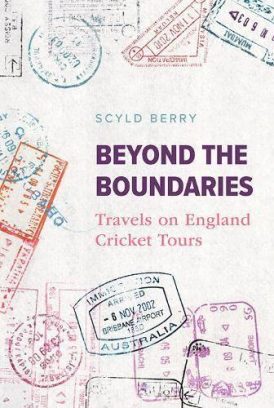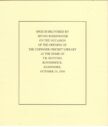Beyond The Boundaries
Martin Chandler |Published: 2021
Pages: 246
Author: Berry, Scyld
Publisher: Fairfield Books
Rating: 4.5 stars

Scyld Berry is a terrific writer, always has been and always will be, and it has been a joy to read his this, his first book since his 2015 tour de force, Cricket: The Game of Life. That one is a book I much enjoyed reading and has a unique ‘claim to fame’, that being that it is, to date, the only book I have ever set out to review and failed. I did start to write a review, but never finished, fearing after a number of false starts that however hard I tried I was not going to be able to write anything that did justice either to the book or to myself.
And since then I have not, to my great regret, had the pleasure of being able to read Scyld’s work. A newspaperman for more than forty years I first had the pleasure of reading him when he was cricket correspondent of The Observer, from where I was happy to follow him to the Independent on Sunday. I did however draw the line at buying the Daily/Sunday Telegraph after Scyld made his move there. For some time that didn’t matter as, rather in the manner of Gubby Allen refusing to bowl ‘Bodyline’ on principle whist still standing in Jardine’s leg trap, I was quite happy to read the sports pages of a colleague’s Telegraph, until he rather inconsiderately retired in 2016.
So Beyond The Boundaries is the first chance I have had to read Scyld for half a decade, and I am pleased to report that, quality wise, nothing has changed. The man remains a pleasure to read. He never states the obvious, never wastes words, and always leaves his reader with much more knowledge and insight than he or she started with, but without having been lectured to get there. As well as that it is also clear that Scyld, by no means the first to have set himself a lockdown writing project, will have much enjoyed writing Beyond The Boundaries a book that, whilst it certainly is a cricket book, is perhaps only tangentially so.
There are nine chapters altogether, each of them looking at one of the Test playing countries that has Scyld has visited in his many years of following England teams on tour. All are fascinating glimpses into the geography and culture of those countries with, naturally, some tales concerning cricketers or games of cricket, but by no means always those that Scyld has been paid to watch.
Of the countries visited the two chapters that taught me the most were undoubtedly those concerning Bangladesh and Sri Lanka. Even with Scyld’s description I still find it difficult to get my head round what life must be like for the ordinary citizen in the former East Pakistan. As for Sri Lanka in some ways society there seems in many ways not to be so very different from the Ceylon where my father did his National Service in the late 1940s, and spent most of his two years there playing cricket. That said the less attractive features of a modern society suffering from internal strife is not ignored.
There are also historical strands throughout the book, and nowhere are they of more interest than in relation to South Africa. The West Indies chapter, concerning one tour but several countries, contains much of interest, not least the cricketing rivalry between St Kitts and Nevis, something it is difficult to imagine any other writer picking up on.
By definition there is, of course, no chapter in Beyond The Boundaries which deals with the British Islands but, as a man who has to admit to never having left Europe, it is a place I know a great deal about, and all of its regional variations. Quite why I then blithely assume that all other countries of the world lack those variations I know not, but Scyld’s writing brings sharply into focus just how diverse huge countries like Australia, Pakistan and India are.
I have heard it said, more than once, that of all the cricket playing nations the most like England is New Zealand, which I do accept is possibly correct in some ways, but it is an observation I see now that I had simply misinterpreted when concluding it meant that our two countries are very similar. Thanks to Beyond The Boundaries I now realise that they are not, and that being more than 11,000 miles away means the Shaky Isles really are in a very different corner of the globe.
Although Beyond The Boundaries is more of a travelogue with a cricketing theme than the sort of book we are used to reviewing here there are still occasional reminders of Scyld’s skill as a writer on purely cricketing matters, and the best example of that comes in the final and shortest chapter, that concerning Zimbabwe where, in the space of not even two pages, Scyld produces a succinct and utterly convincing explanation of the cricketing enigma that was Graeme Hick.






Leave a comment